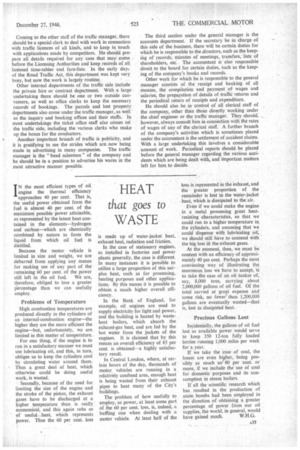HEAT
Page 37

If you've noticed an error in this article please click here to report it so we can fix it.
that goes to
WASTE
IN the most efficient types of oil engine the thermal efficiency approaches 40 per cent. That is, the useful power obtained from the fuel is almost 40 per cent, of the maximum possible power attainable, as represented by the latent heat contained in the elements—hydrogen arid carbon—which are chemically combined by nature to form the liquid from which oil fuel is distilled.
Because the motor vehicle is limited in size and weight, we are debarred from applying any means for making use of any part of the remaining 60 per cent, of the power still left in the oil fuel. We are, therefore, obliged to lose a greater percentage than we can usefully employ.
Problems of Temperature
High combustion temperatures are produced directly in the cylinders of an internal-combustion engine—the higher they are the more efficient the engine—but, unfortunately, we are limited in this matter of temperature.
For one thing, if the engine is to run in a satisfactory manner we must use lubricating oil, and this, in turn, obliges us to keep the cylinders cool by circulating water around them. Thus a great deal of heat, which otherwise could be doing useful work, is wasted.
• Secondly, because of the need for limiting the size of the engine and the stroke of the piston, the exhaust gases have to be discharged at a higher temperature than is really economical, and this again robs us of useful . heat, which represents power. Thus the 60 per cent. loss is made up of water-jacket heat, exhaust heat, radiation and friction.
In the case of stationary engines, as installed in factories and power plants generally, the case is different. In many instances it is possible to utilize a large proportion of this surplus heat, such as for processing, heating purposes and other applications. By this means it is possible to obtain a much higher overall efficiency.
In the Bank of England, for example, oil engines are used to supply electricity for light and power, and the building is heated by wasteheat boilers, which absorb the exhaust-gas heat, and are fed by the hot water from the jackets of the engines. It is claimed that by this means an overall efficiency of 85 per cent. is obtained—a highly satisfactory result.
In Central London, where, at certain hours of the day, thousands of motor vehicles are running in a relatively confined area, enough heat is being wasted from their exhaust pipes to heat many of the City's buildings.
The problem of how usefully to employ, as power, at least some part of the 60 per cent. loss, is, indeed, a baffling one when dealing with a motor vehicle. At least half of the
loss is represented in the exhaust, and the greater proportion of the remainder is lost in the water-jacket heat, which is dissipated to the air.
Even if we could make the engine in a metal possessing great heatresisting characteristics, so that we could run to a higher temperature in the cylinders, and assuming that we could dispense with lubricating oil; we should still have to contend With the big loss in the exhaust gases.
At the moment, then, we must be content with an efficiency of approximately 40 per cent. Perhaps the most convincing way of illustrating the enormous loss we have to accept, is to take the case of an oil tanker of, say, 8,000 tons, carrying about 2,000,000 gallons of oil fuel. Of the total carried at great expense and some risk, no fewer than 1,200,000 gallons are eventually wasted—that is, lost in dissipated heat.
Precious Gallons Lost
Incidentally,, the gallons of oil fuel lost as available power would serve to keep 350 12-ton fully loaded lorries running 1,000 miles per week for a year.
If we take the case of coal, the losses are even higher, being possibly as much as/. 80 per cent. or more, if we include the use of coal for domestic purposes and its consumption in steam boilers.
If all the scientific research which has resulted in the production of atom bombs had been employed in the direction of obtaining a greater percentage of power from our oil supplies, the world, in general, would have gained much. W.H.G.




































































